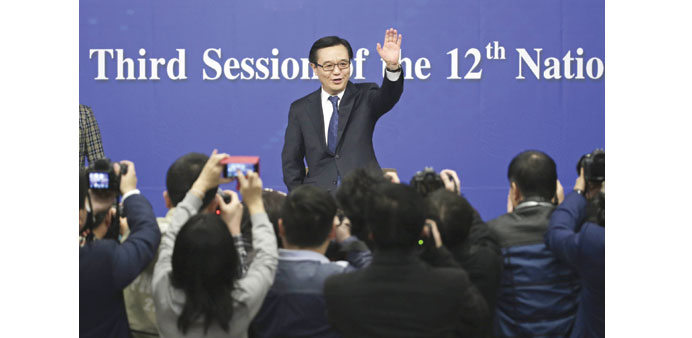Gao Hucheng waves to the media as he arrives for a news conference at the annual session of the National People’s Congress in Beijing yesterday. China hopes to finish talks on creating an Asian free-trade bloc estimated to cover 28% of the world economy by the end of this year.
Reuters
Beijing
China hopes to finish talks on creating an Asian free-trade bloc estimated to cover 28% of the world economy by the end of this year, the country’s trade minister said yesterday.
Gao Hucheng said on the sidelines of China’s annual session of parliament that China would work hard to wrap up talks for the RCEP, or Regional Comprehensive Economic Partnership, before the end of this year.
RCEP, which comprises the 10-nation Asean club plus six others – China, India, Japan, South Korea, Australia and New Zealand – is a Beijing-backed trade framework that has gained prominence as an alternative to US trade plans.
Asean, or the Association of Southeast Asian Nations, groups Vietnam, Thailand, Singapore, the Philippines, Malaysia, Myanmar, Laos, Indonesia, Cambodia, and Brunei.
The US has been leading negotiations on a more comprehensive US-backed Trans-Pacific Partnership (TPP) trade plan that involves 12 countries, not including China.
Gao said China was closely monitoring and assessing the impact of the TPP deal on global trade, and that the Chinese government welcomed any trade framework that was open and transparent.
China will “continue to unswervingly push forward and quicken the pace of China’s free-trade agreement strategy”, Gao told a news conference.
He reiterated that China was confident of growing its trade flows by around 6% this year, as targeted by the government, even though he warned that the country’s import and export growth likely shrank in February. China is set to release its February trade data today, and exports are forecast to recover after a grim January reading.
The median forecast of 16 analysts polled by Reuters showed annual export growth probably shot up to 14.2% on an annual basis in February, recovering from a 3.3% contraction in January that surprised analysts. Imports are seen declining again, however, dropping 10%, although still an improvement compared to January’s plunge of 19.9%.

